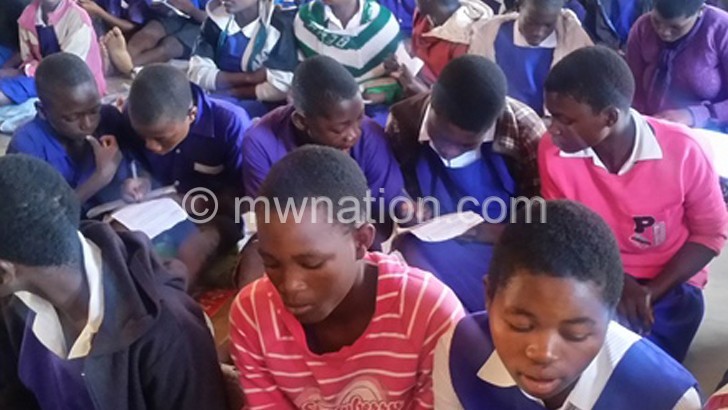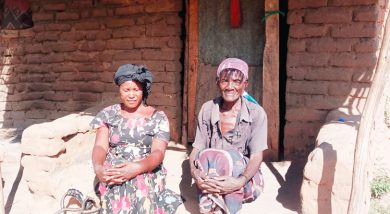Innovating to leave no pupil behind
At the end of a class session at Nthulo Primary School in Thyolo, Standard Seven teacher George Mphanje announces task time. Within a minute, some pupils rush to a box placed at one end of the classroom and pick cards.
They are group representatives and on the card are group tasks. After the task, the group of three share their work with another set of three and record their tasks on the task record register mounted on the wall and discuss the answers as a class. No one fails or passes as an individual.

“The pupils no longer work in isolation,” explains Mphanje. “As a trio, they are able to discuss tasks and this has been helpful to slow learners.”
He says the membership of the group is strategically designed to address gender issues and blends fast and slow learners.
The school is doing this under a 400 primary schools initiative being implemented by Dapp teacher graduates working in public schools. The 80 teachers from 69 public schools in 18 districts, are working on voluntary basis.
The teachers chose to come together and work on ideas that can transform teaching and learning in primary schools, particularly those in rural areas.
“We are unpaid volunteers. What we want is to improve teaching and learning approaches to help pupils pass examinations,” says Mphanje.
There is no limit on the innovations. The teachers have developed supplementary teaching materials called ‘The spine of the programme’ which complement the formal education curriculum.
Mphanje says due to scarcity of textbooks for the formal curriculum, the supplementary materials are imperative.
In addition to the trios model, the supplementary textbooks contain club and group concepts of handling large classes.
According to the project concept, emphasis is on giving attention to each learner to maximise their learning. The initiative also promotes learner-centred teaching and learning methods that also involve community members, parents and guardians in their wards’ education. Each learner’s case is treated separately and all partners, are involved until the learner performance improves.
There are already fruits to show. For instance, at this school, the pass rate has improved. Mphanje says since 2014, they have been achieving above 90 percent pass rate at Primary School Leaving Certificate of Education (PLSCE) examinations.
Elizabeth Ndalama, a Standard Seven pupil at Nthulo Primary School, says until this year, her performance used to be below average. Last school term, her parents spoiled teachers with drinks and snacks for improving her performance to an average of 70 percent.
“I am now optimistic that I will go to a national secondary school,” she says.
Ndalama says the initiative helps them to discuss tasks and raise relevant questions with their teachers. Outside school, she says they meet as trios for climate smart activities
According to Stanley Kachidowo, a Dapp graduate at Mafosha Primary School in Dowa, the school scored 100 percent pass rate in PLSCE examinations.
The school is not the only one that has struggled to improve the pass rate. Since independence, the transition rate from primary to secondary schools has been low and is currently at 35 percent. As a result, there are over five million pupils in primary schools and only 400 000 in secondary school.
Malawi has been struggling to achieve an 80 percent passrate at PSLCE examinations level. For instance, during the last three years, the highest performance was 77 percent recorded in 2016. Thus, on average, above 20 percent (over 50 000 pupils) fail the examinations every year. Most of these pupils are forced to repeat or quit education.
United Nations’ Sustainable Development Goals (SDGs) consider education as critical recipe for achieving the goals. One of the themes is No One Should Be Left Behind. Failing to come up with ideas that can push these 50 000 plus pupils forward maybe a time bomb that will frustrate Malawi’s efforts to achieving some of the SDGs.
The African Union is already panicking and through the Agenda 2040, has set out an ambitious strategy that, among others, targets the neglected groups in education to ensure everyone has access to quality education and opportunities to excel through the education cycle.
Thus, creation of child-friendly schools and systems that push every pupil forward are imperative. In Malawi, there is hope in the government’s early reading programme, but it only targets pupils in Standard One to Four and the focus is to teach pupils to read and write earlier while the 400 primary school project focuses on improving the general performance of every pupil in all classes and if adopted nationally, can improve performance in schools.
Dapp has since put structures to support the teachers. Project coordinator, Jimmy Kayange, says: “We want to ensure no child is left behind. We are not paying the teachers, but only helping them in coordination. Dapp is happy for teachers who think innovation and the goal is to reach 400 schools.”





